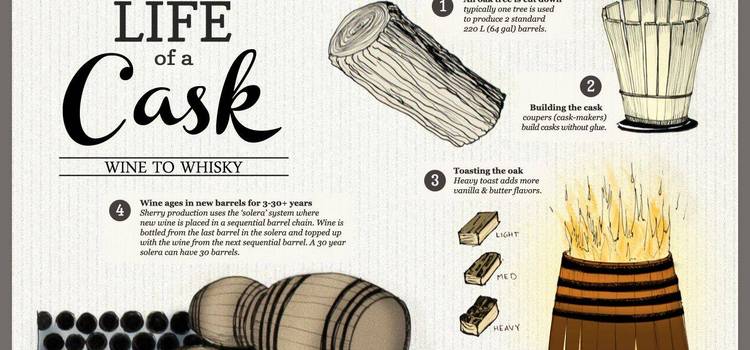If you ever needed a reason to become an environmentalist, consider this:
Without forests there is no wine, no wine, no scotch…
Suddenly, protecting the environment takes a whole new meaning as you tenderly grasp your glass of Aberlour 12. In the infographic below, you see how a 70-80 year old oak tree produces only 2 64 gallon barrels:

About The Oak
High-end distilleries take their casks, and therefore the oak they come from, very seriously. Dr. Lumdsen from Glenmorangie has talked about how he works with the people that grow the trees to make sure he gets the quality in the wood that he wants. From an interview:
Asked to comment on the rumors that Glenmorangie owns their own forest land in the Ozarks to control their supply of American Oak, Lumsden was amused. “We do not own the land, but we do have full control”. He went on to explain the superiority of air matured wood over kiln dried. “Not only does it remove much of the moisture content but it lets the wood actually mature, therefore it is less green, has less tannin and bitter flavors. This is important in letting the oak impart its wonderful vanilla, coconut and almond flavors. A low degree of tannin also allows for the development of that sweet, silky mouth feel that is so appropriate for the house brand.”

About the Coopers
From the infographic we see how precise the work of the cooper must be in order to ensure the best usage of the oak and the highest quality barrels. However, as is common with most artisanal labor, coopers have slowly become obsolete, with only the finest distilleries supporting the craft. In fact, the cooperage at Seguin Moreau, a cooperage owned by the House of Rémy since 1971, works only for the express purposes of providing barrels made of Limousin oak. Limousin oak is renowned for the rich vanilla-like flavor it imparts to cognac. Rémy Martin will then produce Rémy Martin Grand Cru in these barrels with a retail cost well in excess of USD $1500 per bottle, a single barrel being expected to hold nearly a quarter of a million dollars’ worth of cognac.
To Mature Whisky, Only Oak Casks
Not only because it’s a legal requirement; oak is flexible and solid at the same time while it adds very distinct elements to the spirit inside the cask as well. Just like all French cognacs have been matured exclusively in Limousin oak casks, only a few oak species are used for whisky casks; White American oak (Quercus alba) and European oak (Quercus robur).
